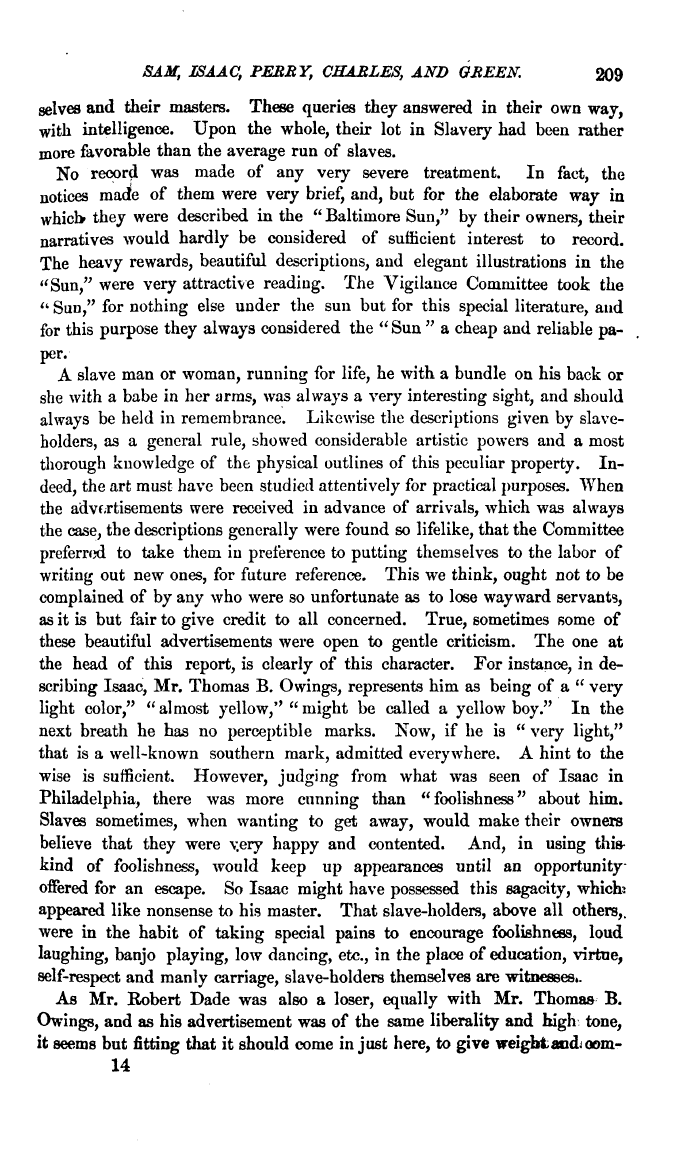 |
||||
 |
||||
| SAM, ISAAC, PERRY, CHARLES, AND GREEN. 209 selves and their masters. These queries they answered in their own way, with intelligence. Upon the whole, their lot in Slavery had been rather more favorable than the average run of slaves. No record was made of any very severe treatment. In fact, the notices made of them were very brief, and, but for the elaborate way in which they were described in the " Baltimore Sun," by their owners, their narratives would hardly be considered of sufficient interest to record. The heavy rewards, beautiful descriptions, and elegant illustrations in the "Sun," were very attractive reading. The Vigilance Committee took the " Sun," for nothing else under the sun but for this special literature, and for this purpose they always considered the " Sun " a cheap and reliable paper. A slave man or woman, running for life, he with a bundle on his back or she with a babe in her arras, was always a very interesting sight, and should always be held in remembrance. Likewise the descriptions given by slaveholders, as a general rule, showed considerable artistic powers and a most thorough knowledge of the physical outlines of this peculiar property. Indeed, the art must have been studied attentively for practical purposes. When the advertisements were received in advance of arrivals, which was always the case, the descriptions generally were found so lifelike, that the Committee preferred to take them in preference to putting themselves to the labor of writing out new ones, for future reference. This we think, ought not to be complained of by any who were so unfortunate as to lose wayward servants, as it is but fair to give credit to all concerned. True, sometimes fiome of these beautiful advertisements were open to gentle criticism. The one at the head of this report, is clearly of this character. For instance, in describing Isaac, Mr. Thomas B. Owings, represents him as being of a " very light color," "almost yellow," "might be called a yellow boy." In the next breath he has no perceptible marks. Now, if lie is " very light," that is a well-known southern mark, admitted everywhere. A hint to the wise is sufficient. However, judging from what was seen of Isaac in Philadelphia, there was more cunning than "foolishness" about him. Slaves sometimes, when wanting to get away, would make their owners believe that they were v.ery happy and contented. And, in using this-kind of foolishness, would keep up appearances until an opportunity-offered for an escape. So Isaac might have possessed this sagacity, whicbs appeared like nonsense to his master. That slave-holders, above all others,, were in the habit of taking special pains to encourage foolishness, loud laughing, banjo playing, low dancing, etc., in the place of education, virtue, self-respect and manly carriage, slave-holders themselves are witnesses*. As Mr. Robert Dade was also a loser, equally with Mr. Thomas B. Owings, and as his advertisement was of the same liberality and high tone, it seems but fitting that it should come in just here, to give weight and. oom-14 |